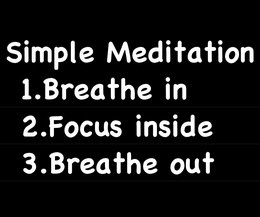A short meditation can go a long way in reducing stress

Susan Scott Morales | Contributor
One of the questions I hear often in my meditation classes is, "How long do I have to meditate?"
In our culture of do, do, do and produce, produce, produce, we look for formulas, rules and guidelines. Everyday we’re plummeted with responsibilities, some we choose and some we don’t.
We all know about stress. So naturally people worry, “Is meditation one more thing I have to learn and figure out how to fit into my life?”
The answer is "yes," but it is the most simple, most gentle and easiest thing you’ll ever have to learn. Meditation can take a few seconds: take a breath, focus inside and exhale. There, you’ve done it. Perhaps you already feel a little better.
Of course, we can elaborate. Check out my index for techniques that help you experience deeper meditations. If your goal is to balance the stress in your life, I suggest sprinkling your day with mini meditations: breathe in, focus on your feelings, and exhale.
These mini meditations are more powerful when we have compassion for our feelings. This is actually the most important part. By feeling compassion, you’re relieving yourself from the stress — no matter how bad it feels.
We tend to be critical of feelings and think we should feel differently. This is counter-productive to relaxing. Think about how much compassion you need in order to balance out all the moments of judgment and criticism.
So take another moment to breathe, focus, feel compassion for yourself, and exhale. Repeat this every time you think of it throughout the day. And let me know how it works for you.
Susan Scott Morales is a meditation teacher, psychotherapist, published poet, novelist, and community contributor to AnnArbor.com and blogger on redroom.com. Tweet her @susanscottmoral, reach her at susanmmorales@yahoo.com or visit her website: susanscottmorales.com or fan page: https://www.facebook.com/susanscottmorales.writer.


Comments
BhavanaJagat
Mon, Aug 29, 2011 : 4:08 p.m.
I am responding to this post as the topic is titled 'Health'. The human organism responds to stress in two manners; 1. FIGHT, and 2. FLIGHT. To run away from danger is a reasonable response if there is a real threat to existence. If there is no such real threat to existence, we must choose the option of 'Fight'. I had trained people who work in Armed Forces and prepared them to fight stress imposed by physical, chemical, biotic, and environmental factors. Those are the external causes for stress. At the same time, we prepare people to resist internal stress and the training that we impart makes man stress-resistant. Meditation is not the tool that we have used. Meditation represents the flight response and makes you more vulnerable when you encounter a stressful situation again. The relaxation it may give is transient. The relaxation is because of the fact that you have removed yourself from a stressful situation and taken the opportunity to focus your attention on some other task. You would experience true and complete relaxation if and only if you confront the stressful situation and overcome it. Each time you overcome the stressful situation, you become more stress-resistant. Kindly analyze as to what is the reason for the stress, and prepare yourself to fight it if there is no overwhelming threat to your life. When you get back home, you would be a truly relaxed person and there is no stress left over to deal with. Compassion is an instinct that is generated when you witness the pain that is experienced by another person. If you recognize your pain, it generates a feeling called self-pity. Treat yourself with respect, and dignity. You do not want to live with self-pity and self-pity will not heal your mental, or physical injuries.